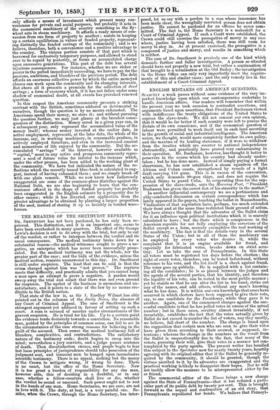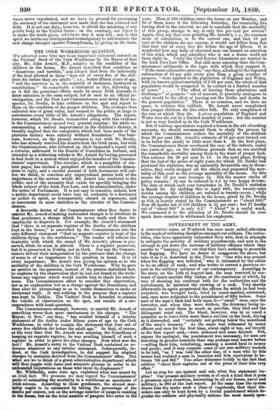ENGLISH MISTAKES ON AMERICAN QUESTIONS. SCARCELY a week passes without
some evidence of the very im- perfect knowledge upon which our contemporaries undertake to handle American affairs. Our readers will remember that within the present year we took occasion to contradict assertions, and. arguments based upon assertions, that President Buchanan viewed with indifference the treaty obligations of the United States to supress the slave-trade. We did not conceal our own opinion, that it would be far better if each country were left to pursue the dictate of its own conscience, and if the economical question of labour were permitted to work itself out in each land according to the growth of social and industrial intelligence. The American union we thought, would more completely further its own policy, and the maxims of its leading statesmen, if it were to withdraw from the treaties which are counter to national independence abstractedly, and practically have proved very embarrassing in their operation. Mr. Buchanan, however, has thought it better to persevere in the course which his country had already under- taken ; but he has done more. Instead of simply paying a formal observance, he has now established a steam squadron off the African and Cuban coasts, strengthened by vessels of a light draft carrying 116 guns. This is in excess of the convention, which only demands 80-gun ships, and does not require the United States to guard Cuba. In cooperating thus for the sup- pression of the slave-trade, says the Morning Post, "President Buchanan has given the surest test of his sincerity in the matter." In another influential contemporary we see a pertinacious and ably-conducted discussion on certain correspondence which has lately appeared in the papers, touching the ballot in Massachusetts. Vindicators of that regulation have, perhaps too much extended their front and at the same time restricted their ground of action. We have always thought that the advocates of the Ballot claim for it an influence upon political institutions which it is scarcely calculated to have ; but the State which is conspicuous in the American republic for not fully employing the coverture of the Ballot except as a form, scarcely exemplifies the real working of the machinery. The fact is that the details vary in the several States of the Union ; but in all of them the machinery can be employed by every voter who desires it, while the complaint that it is an engine available for fraud, and especially for fabricated votes breaks down on strict sent- tiny. Let us take the case of Pennsylvania. In this State all voters must be registered ten days before the election ; the right of every voter, therefore, can be tested beforehand, without reference to his vote, and the list itself is a check against fraud. The voter goes up publicly. He is supplied with a list contain- ing all the candidates ; he is so placed between the judges and. the agents of the several parties, that his identity, and therefore the legality of his vote, can be tested in the most public manner ; yet he stands so that he can alter the list in his hand, strike out any of the names, and add others, without any man's knowing what he has done. It is within our own knowledge that cases have occurred in which electors have been supposed to give their vote, say, to one candidate for the Presidency, while they gave it to another. Again, one of the commonest charges against the suc- cessful candidate is that he has polled votes in excess of the actual number ; but in these cases, scrutiny almost invariably, if not invariably, establishes the fact that the votes actually given by Ballot do not exceed in number the list of voters, nay they mostly, we believe, fall short of the number. The charge is based upon the supposition that certain men who are seen to give their votes have given them according to their avowed, or supposed, in- tentions; whereas the change in the numbers as the result from the Ballot is unquestionably due to the fact, that many of the voters, pursuing their will, give their votes in a manner not con- templated by the party agents. The present writer has handled this subject in the Spectator now for nearly twenty years, heartily, agreeing with its original editor that if the Ballot be generally re- quired by the community, it should be granted, though the virtues ascribed to it by its advocates are exaggerated and the practical working is likely to disappoint their hopes. But he will not tacitly allow the measure to be misrepresented either by foe or friend.
The commercial editor of the Times brings a new charge against the State of Pennsylvania—that it has reduced a parti-
cular part of its public debt by twenty per cent. This is brought forward as the sequel and confirmation of an old story, that Pennsylvania repudiated her bonds. We believe that Pennsyl-
Tanis never repudiated, and we have no ground for presuming the accuracy of the statement now made that she has reduced her debt. It is not our duty, however, to shield the misdoing of any public body in the United States ; on the contrary, our object is to make the truth plain, whichever way it may tell ; and in this spirit we invite our distinguished contemporary to substantiate the new charge brought against Pennsylvania, by giving us the facts.



























 Previous page
Previous page